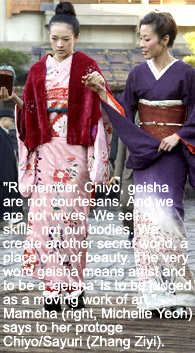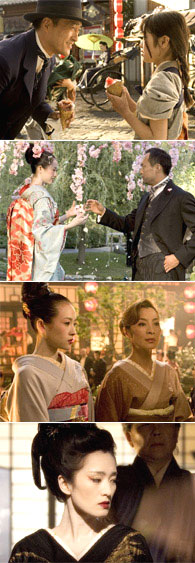
The general sentiment of the film is a hazy-eye nostalgia for an ancient world of strict traditions and order that has faded irrevocably. It is also a rite-of-passage, for both Sayuri and a post-Chicago Rob Marshall, to capture the imagination of the spectacle-drunk masses.
Ok, so the film has been roundly panned by critics. The halting deliveries of the dialogue aside, the main charge against the film, it seems, points to the hollowness of the adaptation under the guise of so much beautifying trappings which high production values invariably entail. The critics called this latest effort by Chicago's director simplistic. Guess they thought Chicago was really profound... In any case, most seem to regard Arthur Golden's source novel the stuff of literary auterism with brows arched so sharp and high that any attempt at adaptation has to aim at an artistic welkin that is beyond mere translation between media - a kind of homage of grandiose solemnity. I don't know: I took an interest in the novel when it was first published in 1997. But only its first quarter. "Vapid" was not the appropriate word, neither was it a precise nor encapsulating one - I couldn't think of another. Not even now. I guess it is simply beyond me.
The film starts off with shots of a fishing-village on a dark, stormy night, right out of a Wuthering-Heights imagination. In a few moments, we learn that a transaction has been carried out in one of the run-down shanties. Before long, little Chyio and her older sister are sold by their father to the pleasure district in the city of Kyoto: Little Chyio to an Okiya as an apprentice Geisha, while the sister to a low-end brothel.
In the stern hands of the Okiya's Okasan (a superb Kaori Momoi), Chyio has to bear the brunt of hard labour and the tempestous bullying of the Okiya's star Geisha Hatsumomo (all hail the incomparable Gong Li, whose performance here marks an auspicious start to her Hollywood career). Until the day Chyio falls under the apprenticeship of Mameha, rival of Hatsumomo. Then, Sayuri is born: no more lowly chambermaid but amorous muse to all men great and small, or average, who trail after her, garlanding the wake of her kimono like wind-shaken sakura. And it is at this point that the real drama begins... No points for guessing who triumphs at the end of the mayhem.

From the top: The Chairman ( Ken Watanabe) meets and cheers pre-pubescent Sayuri (Zhang Ziyi) up by the city river years where she falls in love with him; Zhang and Watanabe some years later, Zhang and Yeoh, and Hatsumomo (Gong li).
Geisha leaves no doubt that it is Hollywood gloss painted most beautifully. But with so many colours flying across the screen like lurid verbal bitchery, with so many costume changes, you would expect Geisha to be more than an one-act drag routine, which it is sadly. The film's successive intrigues soon wear themselves out. Even its twin storyline involving the romance between The Chairman (an avuncular Ken Watanabe) and Sayuri loses its sparks soon enough, which it has little to begin with - the pairing of Zhang Ziyi and Ken Watanabe seems oddly antiseptic, like an arranged courtship between two promotional mascots from one of those big, garish commercials adorning the skyscrapers in Lost in Translation. There is also something vaguely, but admittedly disturbing about the obsession occurring between a pre-pubescent girl and a much older gentleman, even in this post-Lolita age. But then again, who is to decide the source of passion, or its course?
Oh yah, Zhang Ziyi lost her Globe to Felicity Huffmann, who played a transgendered father in Transamerica. Hmmm� Was it because of the make-up? Or the lack of.











 Printable Version
Printable Version









